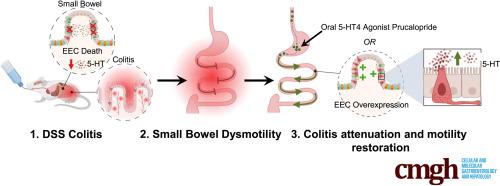当前位置:
X-MOL 学术
›
Cell. Mol. Gastroenterol. Hepatol.
›
论文详情
Our official English website, www.x-mol.net, welcomes your feedback! (Note: you will need to create a separate account there.)
Colitis-Induced Small Intestinal Hypomotility Is Dependent on Enteroendocrine Cell Loss in Mice
Cellular and Molecular Gastroenterology and Hepatology ( IF 7.2 ) Pub Date : 2024-03-02 , DOI: 10.1016/j.jcmgh.2024.02.017 Zachariah Raouf , Steve N. Steinway , Daniel Scheese , Carla M. Lopez , Johannes W. Duess , Koichi Tsuboi , Maame Sampah , Daphne Klerk , Mahmoud El Baassiri , Hannah Moore , Cody Tragesser , Thomas Prindle , Sanxia Wang , Menghan Wang , Hee-Seong Jang , William B. Fulton , Chhinder P. Sodhi , David J. Hackam
Cellular and Molecular Gastroenterology and Hepatology ( IF 7.2 ) Pub Date : 2024-03-02 , DOI: 10.1016/j.jcmgh.2024.02.017 Zachariah Raouf , Steve N. Steinway , Daniel Scheese , Carla M. Lopez , Johannes W. Duess , Koichi Tsuboi , Maame Sampah , Daphne Klerk , Mahmoud El Baassiri , Hannah Moore , Cody Tragesser , Thomas Prindle , Sanxia Wang , Menghan Wang , Hee-Seong Jang , William B. Fulton , Chhinder P. Sodhi , David J. Hackam

|
The abdominal discomfort experienced by patients with colitis may be attributable in part to the presence of small intestinal dysmotility, yet mechanisms linking colonic inflammation with small-bowel motility remain largely unexplored. We hypothesize that colitis results in small intestinal hypomotility owing to a loss of enteroendocrine cells (EECs) within the small intestine that can be rescued using serotonergic-modulating agents. Male C57BL/6J mice, as well as mice that overexpress (EEC) or lack (EEC) NeuroD1+ enteroendocrine cells, were exposed to dextran sulfate sodium (DSS) colitis (2.5% or 5% for 7 days) and small intestinal motility was assessed by 70-kilodalton fluorescein isothiocyanate–dextran fluorescence transit. EEC number and differentiation were evaluated by immunohistochemistry, terminal deoxynucleotidyl transferase–mediated deoxyuridine triphosphate nick-end labeling staining, and quantitative reverse-transcriptase polymerase chain reaction. Mice were treated with the 5-hydroxytryptamine 4 agonist prucalopride (5 mg/kg orally, daily) to restore serotonin signaling. DSS-induced colitis was associated with a significant small-bowel hypomotility that developed in the absence of significant inflammation in the small intestine and was associated with a significant reduction in EEC density. EEC loss occurred in conjunction with alterations in the expression of key serotonin synthesis and transporter genes, including , , and . Importantly, mice overexpressing EECs revealed improved small intestinal motility, whereas mice lacking EECs had worse intestinal motility when exposed to DSS. Finally, treatment of DSS-exposed mice with the 5-hydroxytryptamine 4 agonist prucalopride restored small intestinal motility and attenuated colitis. Experimental DSS colitis induces significant small-bowel dysmotility in mice owing to enteroendocrine loss that can be reversed by genetic modulation of EEC or administering serotonin analogs, suggesting novel therapeutic approaches for patients with symptomatic colitis.
中文翻译:

结肠炎引起的小肠运动减退依赖于小鼠肠内分泌细胞的损失
结肠炎患者的腹部不适可能部分归因于小肠蠕动障碍,但结肠炎症与小肠蠕动之间的联系机制在很大程度上仍未被探索。我们假设结肠炎由于小肠内肠内分泌细胞(EEC)的损失而导致小肠蠕动不足,而可以使用血清素调节剂来挽救。将雄性 C57BL/6J 小鼠以及过度表达 (EEC) 或缺乏 (EEC) NeuroD1+ 肠内分泌细胞的小鼠暴露于葡聚糖硫酸钠 (DSS) 结肠炎(2.5% 或 5%,持续 7 天),并评估小肠蠕动通过 70 千道尔顿异硫氰酸荧光素-葡聚糖荧光传输。通过免疫组织化学、末端脱氧核苷酸转移酶介导的脱氧尿苷三磷酸缺口末端标记染色和定量逆转录酶聚合酶链反应评估 EEC 数量和分化。小鼠接受 5-羟色胺 4 激动剂普卡必利(每天口服 5 毫克/公斤)治疗,以恢复血清素信号传导。 DSS 诱发的结肠炎与小肠运动性显着低下有关,这种低运动性是在小肠中没有明显炎症的情况下发生的,并且与 EEC 密度显着降低有关。 EEC 损失与关键血清素合成和转运基因表达的改变同时发生,包括 、 、 和 。重要的是,过度表达 EEC 的小鼠显示小肠蠕动得到改善,而缺乏 EEC 的小鼠在接触 DSS 时肠道蠕动较差。最后,用 5-羟色胺 4 激动剂普卡必利治疗 DSS 暴露小鼠可恢复小肠蠕动并减轻结肠炎。实验性 DSS 结肠炎由于肠内分泌损失而引起小鼠显着的小肠运动障碍,而肠内分泌损失可以通过 EEC 的基因调节或施用血清素类似物来逆转,这为症状性结肠炎患者提出了新的治疗方法。
更新日期:2024-03-02
中文翻译:

结肠炎引起的小肠运动减退依赖于小鼠肠内分泌细胞的损失
结肠炎患者的腹部不适可能部分归因于小肠蠕动障碍,但结肠炎症与小肠蠕动之间的联系机制在很大程度上仍未被探索。我们假设结肠炎由于小肠内肠内分泌细胞(EEC)的损失而导致小肠蠕动不足,而可以使用血清素调节剂来挽救。将雄性 C57BL/6J 小鼠以及过度表达 (EEC) 或缺乏 (EEC) NeuroD1+ 肠内分泌细胞的小鼠暴露于葡聚糖硫酸钠 (DSS) 结肠炎(2.5% 或 5%,持续 7 天),并评估小肠蠕动通过 70 千道尔顿异硫氰酸荧光素-葡聚糖荧光传输。通过免疫组织化学、末端脱氧核苷酸转移酶介导的脱氧尿苷三磷酸缺口末端标记染色和定量逆转录酶聚合酶链反应评估 EEC 数量和分化。小鼠接受 5-羟色胺 4 激动剂普卡必利(每天口服 5 毫克/公斤)治疗,以恢复血清素信号传导。 DSS 诱发的结肠炎与小肠运动性显着低下有关,这种低运动性是在小肠中没有明显炎症的情况下发生的,并且与 EEC 密度显着降低有关。 EEC 损失与关键血清素合成和转运基因表达的改变同时发生,包括 、 、 和 。重要的是,过度表达 EEC 的小鼠显示小肠蠕动得到改善,而缺乏 EEC 的小鼠在接触 DSS 时肠道蠕动较差。最后,用 5-羟色胺 4 激动剂普卡必利治疗 DSS 暴露小鼠可恢复小肠蠕动并减轻结肠炎。实验性 DSS 结肠炎由于肠内分泌损失而引起小鼠显着的小肠运动障碍,而肠内分泌损失可以通过 EEC 的基因调节或施用血清素类似物来逆转,这为症状性结肠炎患者提出了新的治疗方法。



























 京公网安备 11010802027423号
京公网安备 11010802027423号